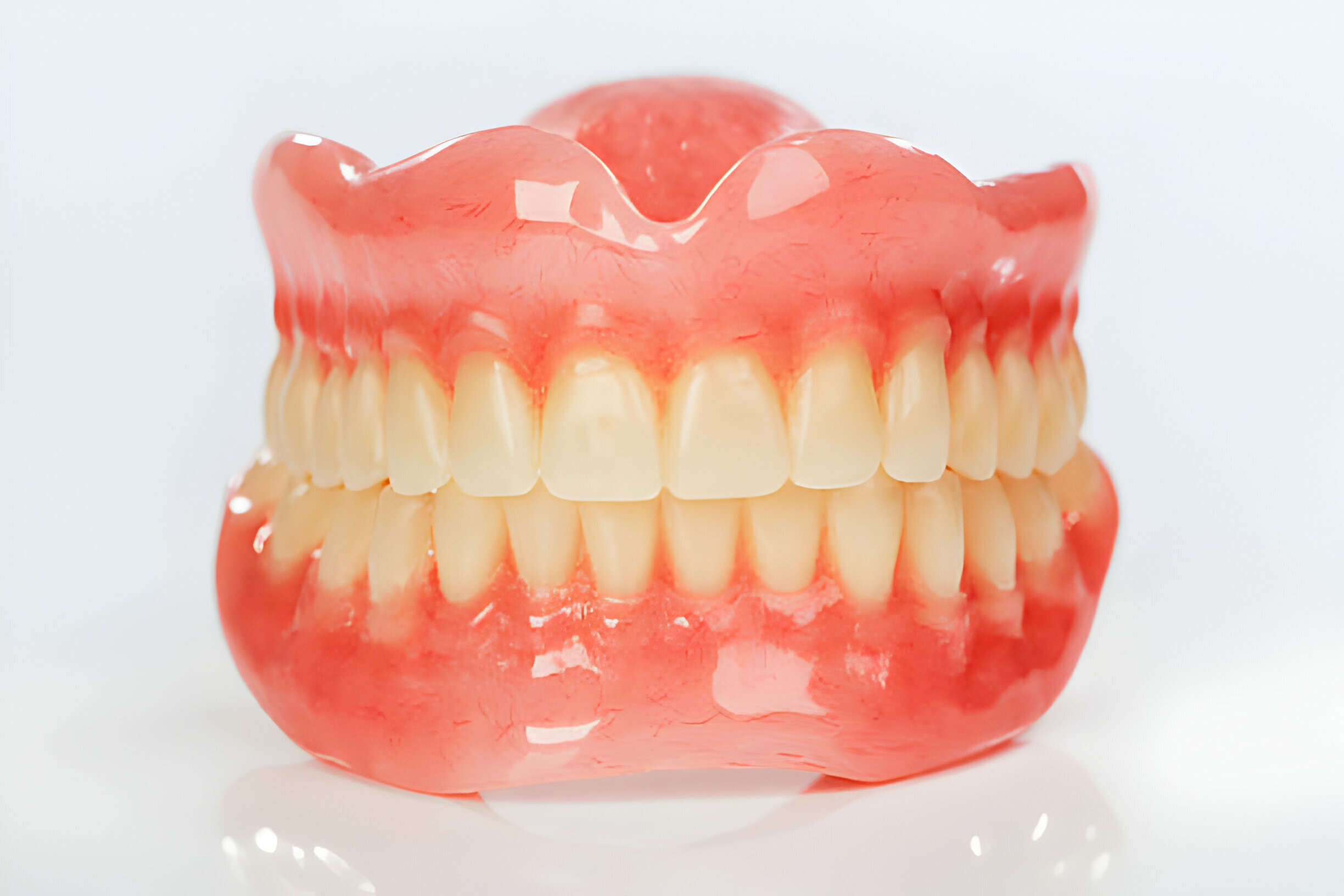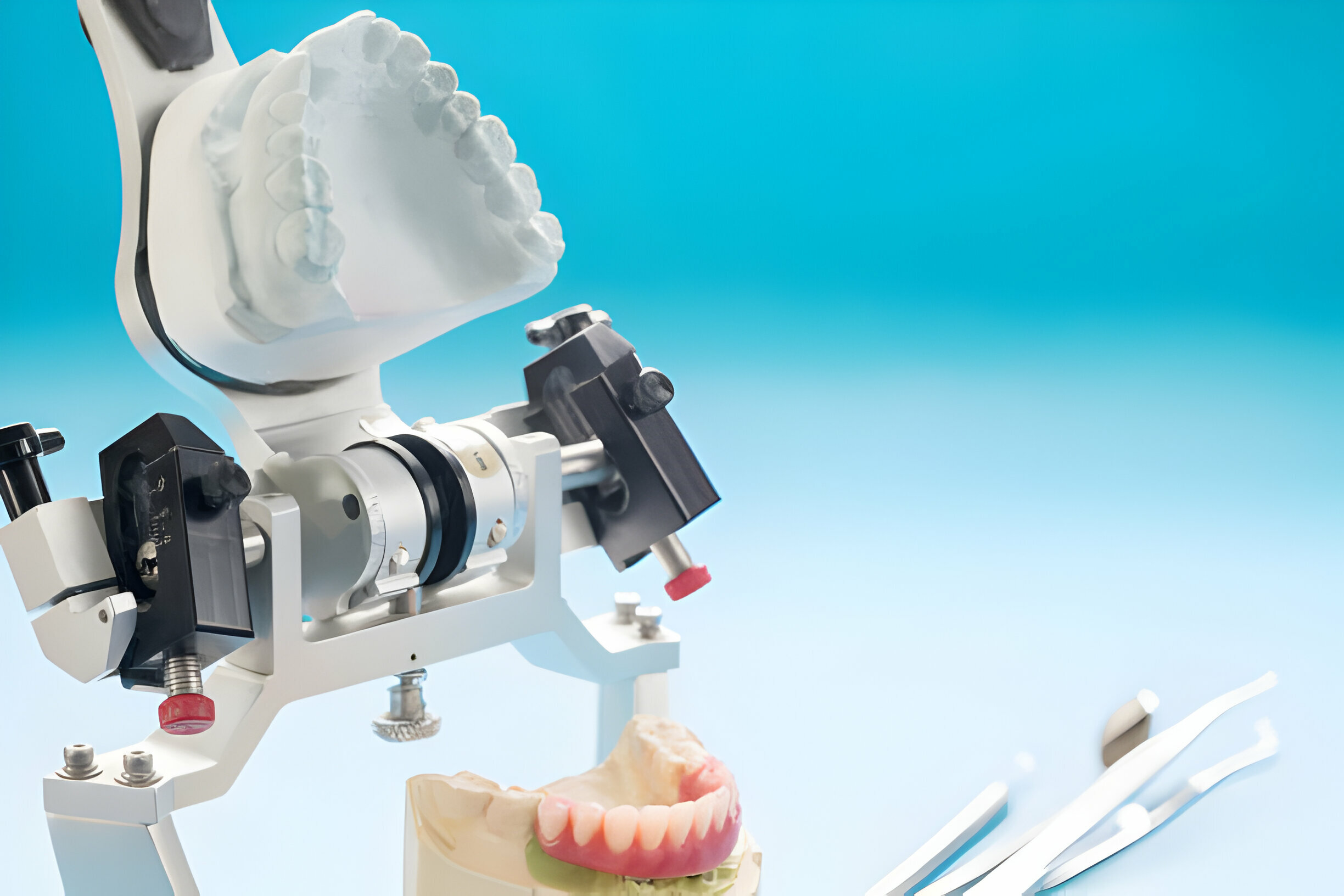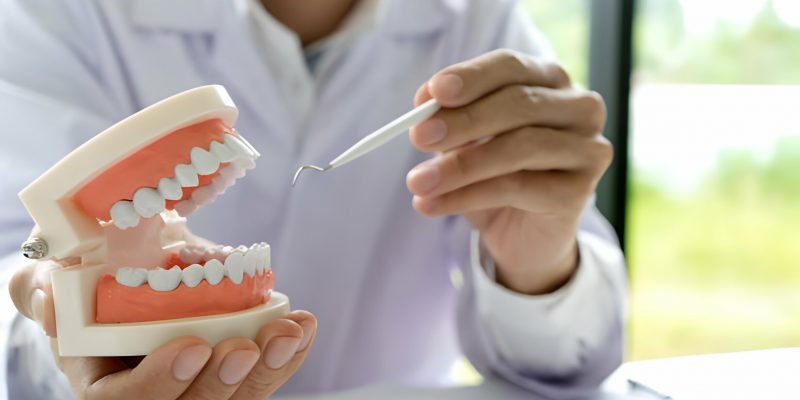Summary:
Did you recently undergo denture therapy?
If yes, then chances are you’re already having difficulty adapting to the oral appliance, like over 42.46 million Americans.
While these custom-molded plastic or metal appliances are designed to replace missing, diseased, or otherwise damaged teeth, they can be tough to adapt. So whether replacing old dentures or transitioning from missing teeth, getting used to eating with false teeth takes time.

Following our research on dentures, we’ve listed out some typical stages of getting used to the appliance through the following sections:
- Three Stages of Learning to Eat With Dentures
- Understanding the Adjustment Period with False Teeth
In the following sections, we take a more detailed look at some valuable tips on eating comfortably and confidently with new dentures. So continue reading as we learn more about eating with dentures in the following sections.
Three Stages of Learning to Eat With Dentures
Stage 1: Initial Adjustment (1-2 Weeks)
The first stage of learning to eat with dentures is the first adjustment period, which usually lasts one or two weeks. During this stage, your mouth, gums, and muscles adjust to false teeth.
Here’s what you should expect throughout this phase of denture-wearing:
- Minor Chewing: Begin by chewing slowly and gently with your dentures, taking small chunks, and utilizing both sides of your mouth. It may feel challenging at first, but chewing often can help strengthen your muscles and enhance your eating ability.
- Soft Food Diet: To reduce soreness and allow your mouth to heal, stick to a diet high in soft, easy-to-eat foods. It includes yogurt, applesauce, mashed potatoes, soups, and vegetables.
- Avoid Sticky or Hard Foods: Sticky or hard meals should be avoided during the initial adjustment period since they may be difficult to chew with false teeth. It contains nuts, seeds, chewy candies, and difficult meats.
- Stay Hydrated: Drink plenty of water when wearing new dentures throughout the day. It allows you to stay hydrated and keep moisture in your mouth and can help ease any dryness or discomfort caused by wearing the appliance.
Stage 2: Building Confidence (2-4 Weeks)
The second step of learning to eat with dentures is gaining confidence and broadening your diet to include a more extensive range of foods. This stage typically happens between two and four weeks after receiving your appliance.
Here’s how to move through this phase:
- Practice Different Chewing Techniques: Explore various techniques to determine what works best for you. Some people find it beneficial to chew on both sides of their mouth simultaneously, but others prefer to chew on only one side.
- Gradually Introduce Firmer Foods: As you become more accustomed to your dentures, slowly incorporate firmer foods into your diet. Before progressing to more challenging options, begin with milder versions of these foods, such as well-cooked vegetables or sensitive meats.
- Be Patient and Persistent: Eating with false teeth requires time and patience, so be patient with yourself through this process. It’s acceptable to make some mistakes along the way, but with practice, you’ll steadily improve your ability to eat comfortably with your dentures.

Stage 3: Mastery and Adaptation (4-8 Weeks)
The third and last step in discovering how to eat while wearing dentures is proficiency and adaptation, which takes place four to eight weeks after you receive your dentures. During this stage, you will continue to improve your eating abilities and adjust to wearing false teeth as smoothly as possible.
Here’s how to tackle this stage:
- Stay Positive: Understand that being able to eat with false teeth is a process, and it’s expected to face difficulties along the way. Maintain a good attitude and focus on your progress, enjoying your accomplishments and requesting support from your dental care team as needed.
- Maintain Good Oral Hygiene: Regular oral hygiene is critical to the health and lifespan of your dentures. Brush your appliance and clean your mouth properly to avoid plaque accumulation, gum inflammation, and foul smell.
- Expand Your Diet: By now, you should be more comfortable eating various foods with your dentures in Frisco. Continue to broaden your diet to include all your favorite foods, making adjustments as necessary to accommodate your dentures.
- Visit Your Dentist Regularly: Schedule regular dental check-ups to ensure that your false teeth fit correctly and that any difficulties or concerns are addressed. Your dentist can alter or repair your appliance to ensure they are comfortable and functional.
Understanding the Adjustment Period with False Teeth
Mechanical Soft Diet
The name refers to food mechanically transformed by mashing, blending, chopping, and grinding to make it easier to chew and digest. Pureed meals, such as cooked cereal, scrambled eggs, applesauce, mashed potatoes, and pudding, provide nourishment without causing gum damage or jaw muscle strain.
Here’s everything you should know about dentures and eating them on a mechanical soft diet:
- Soft Texture: Foods on a mechanical soft diet have a smoother texture, making them easier to chew and swallow. Examples include cooked vegetables, tender meats, soft fruits, mashed potatoes, and scrambled eggs.
- Nutrient-Rich Options: A mechanical soft diet can still include critical nutrients despite its more delicate texture. Incorporating foods from many groups ensures you get enough vitamins, minerals, protein, and fiber.
- Avoid rough or Chewy Foods: A mechanical soft diet often excludes foods that require considerable chewing or are difficult to swallow, such as coarse meats, raw vegetables, nuts, seeds, and hard fruits.
- Individual Needs Adaptations: A mechanical soft diet can be adapted to individual dietary constraints or preferences. This could include pureeing foods, using sauces or gravies to soften textures, or adding nutritional supplements as needed.
Returning to Normal Food

Getting used to your new dentures and eating will take at least a few weeks if not more. But it would help if you remained attentive about what and how you eat. No matter how sturdy your appliance is, remember that they are replacements for teeth permanently embedded in your jawbone. Dentures, on the other hand, rest only against the gums.
Consult Your Healthcare Professionals: Before you change your diet, consult with a healthcare professional or a registered dietitian. They may provide personal advice according to your health status and dietary requirements.
Start Slowly: Gradually reintroduce light, easily digestible foodstuffs that do not irritate the intestines. Some examples may be cooked vegetables, ripe fruits, tender meats, and soft grains.
Monitor Your Body’s Feedback: Take note of any response from your body as you gradually start eating different foods. Be alert to discomfort, such as indigestion, bloating, or other gastrointestinal symptoms.
Your denture dentist will also suggest you eat a mouthful and chew slowly to aid digestion and prevent tooth damage. Additionally, you should drink plenty of water throughout the day to support digestion.
Eating After Healing
Once you’re used to wearing dentures, you should be able to eat nearly anything. Some meals (such as those that are hard, sticky, or challenging) may be inherently difficult to eat.
Even if you have a firm mouth and false teeth that fit well, you may want to avoid certain meals. Remember, at the slightest inconvenience, you should consult the denture professionals at your nearest dentist in Frisco, TX.
Takeaway
- Dentures are effective oral appliances that help you regain confidence after losing a tooth.
- It is essential to consult a healthcare practitioner or nutritionist before making any dietary modifications. Ensure that you drink water throughout the day to remain hydrated.
- Keep up with regular dental care to ensure oral health is maintained. As you return to regular food habits, take it easier on yourself.
- Having a hard time making a comeback with dentures? Connect with our experts at Dental Arts of Frisco today!


